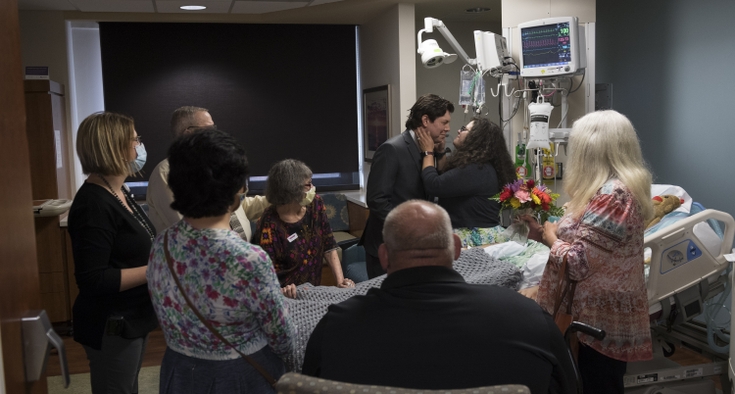In July 2019, Allyson Ware was driving in Charlotte when she noticed a speed limit sign that appeared blurry. She wasn’t overly concerned, but she did schedule an appointment with her ophthalmologist.
The singer and piano teacher, 63, has worn one contact in her right eye for many years but had never had vision problems otherwise. She went to see her eye doctor, who ruled out glaucoma and suggested an MRI. She was diagnosed with a skull-base meningioma, a brain tumor that arises from the meninges — the membranes that surround the brain and spinal cord. The tumor can compress or squeeze the brain, nerves and vessels.
Ware was shocked by the news – a brain tumor? – but was reassured that the tumor was more than likely benign and slow-growing. Her eye doctor referred her to Dr. Ziad Hage of Novant Health Brain & Spine Surgery - Cotswold in early 2020.
Following an evaluation, Hage performed an angiogram — a procedure that shows the blood vessels of the brain and blood flow to the tumor. It showed what vessels the tumor was impacting. Hage explained that the tumor had wrapped around the optic nerve and carotid artery, rendering the surgery highly challenging and complex. She’d probably had the tumor for years, Hage explained.
While Ware was relieved that the tumor was growing slowly, she also had cause for worry. “Dr. Hage explained that this tumor was creeping to my other eye,” she said. “He also said I might lose vision in my right eye. I was in disbelief. You go through all the stages, starting with: This can't be happening to me.”
In fact, Hage said he was surprised Ware hadn’t had a stroke because the tumor had wrapped around the carotid artery and narrowed it significantly.
At her appointments, Ware’s husband and sister were able to ask questions she couldn’t think to ask, as she struggled to come to terms with the diagnosis.
She began envisioning – and making plans for – a future in which she couldn’t see out of one eye. “I used to practice piano with one eye shut just to prove to myself I could do it if I had to,” she said.
All this was happening shortly before COVID hit, which complicated how quickly Ware could schedule surgery. Her brain surgery, originally scheduled for April 2020, was postponed until May.
“All these different critical structures were embedded inside the tumor,” Hage said. “The tumor was also affecting the third nerve, which controls lifting the eyelid as well as motion of the eye in several directions. That's why she was experiencing double vision. It was a very long and challenging case.”
Her surgery lasted about eight and a half hours. “Dr. Hage said he would stop the surgery if my life was threatened at all,” Ware said. “That made me feel a lot safer.”
Hage was able to remove 80% of the benign tumor. “We couldn't get it all because the optic nerve and the carotid artery were involved,” he said. “But we relieved the pressure, allowing her to see better.”
“I think she has had a great result,” Hage said. “It's always our goal to try to remove the entire tumor. In this case, it was impossible, but what we got was sufficient to improve her symptoms.”

Afterward, her skull showed the evidence of the ordeal she’d been through. “I had an incision from the top of my head to my temple,” she said. “I had 30 staples. My eyelid was swollen shut. Dr. Hage told me there was a possibility I wouldn't be able to open that eye after the surgery.”
Ware was in the hospital for seven days. During her recuperation at home, while lying on the sofa, she would massage her swollen eyelid. Eventually, it started to open up.
She has regained most of the vision in her right eye. “I'm fine,” she said. “I teach piano. I sing. I’m still able to do all those things I love. I call Dr. Hage my hero; he saved my life. I don’t know how big this tumor would’ve gotten.
“I’m just so grateful.”










